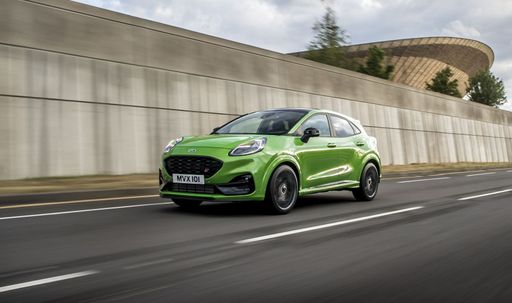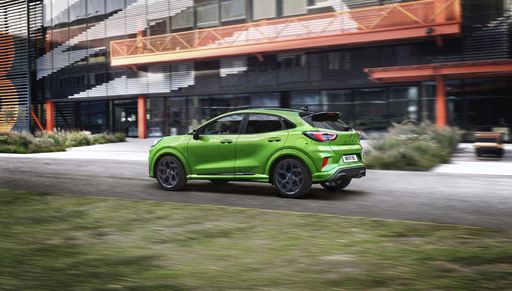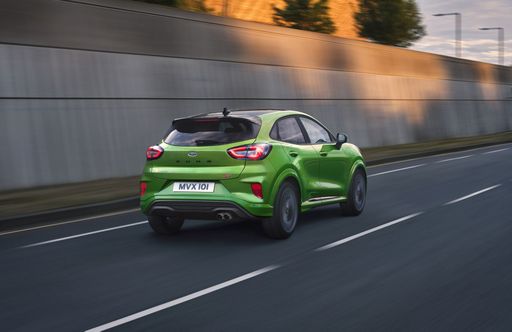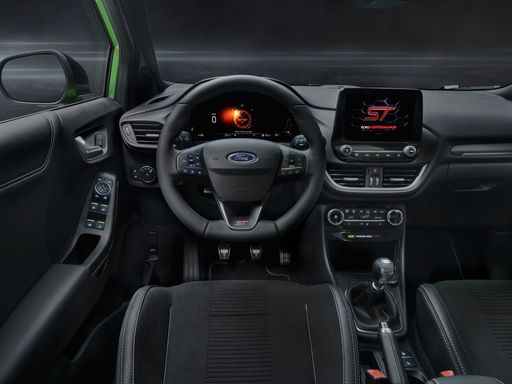Ford Puma vs Fiat Pandina – Differences & prices compared
Compare performance, boot space, consumption and price in one view.
Find out now: which car is the better choice for you – Ford Puma or Fiat Pandina?
The Ford Puma (SUV) comes with a Petrol MHEV or Electric engine and Manuel or Automatic transmission. In comparison, the Fiat Pandina (Hatchback) features a Petrol MHEV engine with Manuel transmission.
When it comes to boot capacity, the Ford Puma offers 523 L, while the Fiat Pandina provides 225 L – depending on how much space you need. If you’re looking for more power, decide whether the 168 HP of the Ford Puma or the 70 HP of the Fiat Pandina suits your needs better.
In terms of consumption, the values are 13.10 kWh5.40 L per 100 km for the Ford Puma, and 5 L for the Fiat Pandina.
Price-wise, the Ford Puma starts at 24800 £, while the Fiat Pandina is available from 14100 £. Compare all the details and find out which model fits your lifestyle best!
Ford Puma
The Ford Puma presents itself as a stylish compact SUV with a distinctive design that combines practicality with a dynamic driving experience. Its sleek lines and sporty aesthetics make it stand out on the road, while the interior offers a comfortable and tech-savvy environment. With an emphasis on efficiency and a smooth drive, the Ford Puma is well-suited for both urban commutes and countryside adventures.
details @ puma.fordpresskits.com
@ puma.fordpresskits.com
 @ puma.fordpresskits.com
@ puma.fordpresskits.com
 @ puma.fordpresskits.com
@ puma.fordpresskits.com
 @ puma.fordpresskits.com
@ puma.fordpresskits.com
Fiat Pandina
The Fiat Pandina, commonly referred to as a spirited urban companion, boasts a charm that's both nostalgic and contemporary. Its compact design embraces city streets with an agile grace, making it an excellent choice for bustling environments. With a reputation for reliability and an economical approach, the Pandina continues to win hearts as a beloved everyday vehicle.
details

|
|
|
|
|
Costs and Consumption |
|
|---|---|
|
Price
24800 - 36300 £
|
Price
14100 - 18000 £
|
|
Consumption L/100km
5.4 - 6 L
|
Consumption L/100km
5 - 5.1 L
|
|
Consumption kWh/100km
13.1 - 13.7 kWh
|
Consumption kWh/100km
-
|
|
Electric Range
364 - 376 km
|
Electric Range
-
|
|
Battery Capacity
43 kWh
|
Battery Capacity
-
|
|
co2
0 - 136 g/km
|
co2
113 - 116 g/km
|
|
Fuel tank capacity
42 L
|
Fuel tank capacity
38 L
|
Dimensions and Body |
|
|---|---|
|
Body Type
SUV
|
Body Type
Hatchback
|
|
Seats
5
|
Seats
4 - 5
|
|
Doors
5
|
Doors
5
|
|
Curb weight
1316 - 1563 kg
|
Curb weight
1055 kg
|
|
Trunk capacity
456 - 523 L
|
Trunk capacity
225 L
|
|
Length
4186 - 4226 mm
|
Length
3635 - 3705 mm
|
|
Width
1805 mm
|
Width
1643 - 1662 mm
|
|
Height
1550 - 1555 mm
|
Height
1551 - 1657 mm
|
|
Payload
367 - 469 kg
|
Payload
365 - 385 kg
|
Engine and Performance |
|
|---|---|
|
Engine Type
Petrol MHEV, Electric
|
Engine Type
Petrol MHEV
|
|
Transmission
Manuel, Automatic
|
Transmission
Manuel
|
|
Transmission Detail
Manual Gearbox, Dual-Clutch Automatic, Reduction Gearbox
|
Transmission Detail
Manual Gearbox
|
|
Drive Type
Front-Wheel Drive
|
Drive Type
Front-Wheel Drive
|
|
Power HP
125 - 168 HP
|
Power HP
70 HP
|
|
Acceleration 0-100km/h
7.4 - 9.8 s
|
Acceleration 0-100km/h
13.9 - 14.7 s
|
|
Max Speed
160 - 210 km/h
|
Max Speed
155 - 164 km/h
|
|
Torque
170 - 290 Nm
|
Torque
92 Nm
|
|
Number of Cylinders
3
|
Number of Cylinders
3
|
|
Power kW
92 - 124 kW
|
Power kW
51 kW
|
|
Engine capacity
999 cm3
|
Engine capacity
999 cm3
|
General |
|
|---|---|
|
Model Year
2024 - 2025
|
Model Year
2024 - 2025
|
|
CO2 Efficiency Class
D, E, A
|
CO2 Efficiency Class
D, C
|
|
Brand
Ford
|
Brand
Fiat
|
Ford Puma
A Glimpse into the Ford Puma: Fusing Style with Innovation
The Ford Puma stands as a testament to modern engineering fused with style. This compact SUV is not just about aesthetics but brings to the table an array of technical innovations, topped with the reliability and performance Ford is known for. Let's delve into the technical specifics and innovative features that make the Ford Puma a stellar choice for any car enthusiast.
Powertrains and Performance
The Ford Puma is offered with a range of powertrains designed to deliver optimal performance whilst minimising fuel consumption. At the heart of this compact SUV is the 1.0 EcoBoost Hybrid engine, available in both 125 PS and 155 PS variants. This engine is a marvel of engineering, optimised to deliver power efficiently with a remarkable fuel consumption ranging from 5.4 to 5.7 L/100km for manual versions, and slightly higher for the automated variants.
The top-end 1.5 EcoBoost ST variant takes performance up a notch, providing a robust 200 PS that propels the Puma from 0 to 100 km/h in just 6.7 seconds. This variant is perfect for those who prioritise performance and exhilaration in their driving experience.
Mild-Hybrid Technology
The Puma's mild-hybrid technology plays a significant role in enhancing fuel efficiency and reducing emissions. By utilising a belt-driven integrated starter/generator, the Puma recovers energy usually lost during braking, storing it in a 48-volt lithium-ion battery. This stored energy is then used to assist the engine, providing a boost during acceleration and smoothing out the stop-start technology, ultimately leading to enhanced fuel efficiency.
Design and Comfort
The Ford Puma does not compromise on style and comfort with its ergonomic and stylish design. The SUV is available in multiple trims including the ST-Line, Titanium, and the luxurious Vignale editions, each offering unique aesthetic and technological enhancements. These trim levels provide varied offerings in terms of both exterior styling and interior comfort, ensuring there's a Puma that meets every personal preference.
Inside, the Puma offers a driver-focused cockpit with advanced technological integrations such as the SYNC 3 infotainment system, providing seamless connectivity and intuitive control of the vehicle's numerous technological features.
Safety and Technology
Safety remains paramount, and the Ford Puma is equipped with the latest security and technology features. It boasts the Ford Co-Pilot360 suite which includes adaptive cruise control, pre-collision assist with autonomous emergency braking, and lane-keeping assist, enabling a safer driving experience on both city roads and highways.
Versatility and Practicality
Beyond performance and safety, the Ford Puma shines in its versatility. With a boot capacity of 456 litres, it offers ample space for all sorts of adventures, whether you're heading on a family trip or loading sports equipment. Its innovative MegaBox is an extra storage solution, providing additional space below the boot floor.
The Puma's agile handling, paired with its compact dimensions—spanning a length of 4186 to 4266 mm and a width of 1805 mm—makes it an ideal choice for urban commuting and beyond.
Conclusion
In conclusion, the Ford Puma beautifully blends practical features with cutting-edge technology, offering a package that appeals to both the tech-savvy driver and those seeking comfort and reliability. Its range of innovative features, powerful yet efficient engine options, and a design that is both functional and stylish make it a frontrunner in the compact SUV market.
Whether you're drawn by the efficient mild-hybrid engines or the robust performance of the ST variant, the Ford Puma represents a modern driving experience where innovation meets everyday usability.
Fiat Pandina
The Fiat Pandina: Urban Mobility Redefined
The urban jungle can be a daunting space, but the Fiat Pandina has carved out a niche for itself as a reliable and economical solution for city driving. With a solid reputation built over years of revamping and refinement, the latest versions of the Pandina continue to appeal to urban dwellers seeking a compact companion.
Modern Engineering Under the Hood
At the heart of the Fiat Pandina is its innovative Petrol Mild Hybrid Electric Vehicle (MHEV) system. This hybrid engine cleverly combines the efficiency of electric assistance with the practicality of a traditional internal combustion engine. It's a harmonious blend that provides not just superior fuel efficiency but also a reduced carbon footprint, with CO2 emissions in the range of 113 - 116 g/km.
All current Fiat Pandina models come with a 999 cm3 engine capacity and three cylinders, delivering a modest yet sufficient 70 horsepower (51 kW). This ensures that the Pandina is not just a lightweight contender in its category but also an environmentally considerate choice.
Efficient and Practical Specs
The Fiat Pandina is designed with practicality in mind, offering a consumption rate between 5 and 5.1 liters per 100 kilometers. This economical fuel consumption is perfectly suited for frequent city commutes and longer suburban journeys. Its torque of 92 Nm ensures that urban driving demands are met with ease, while the maximum speed ranges between 155 and 164 km/h, allowing a nimble performance on open roads.
Despite its compact hatchback design, the Pandina conveniently seats four to five passengers, with extra consideration given to trunk capacity, which stands at 225 liters. This blend of compactness and space ensures that you have enough room for both passengers and their belongings.
Smart Dimensions and Design
The Fiat Pandina is characterized by its smart dimensions, with a length stretching between 3635 and 3705 mm, width from 1643 to 1662 mm, and height ranging from 1551 to 1657 mm. These proportions allow for easy navigation through tight city streets and parking spots while maintaining road presence.
Weighing in at a curb weight of 1055 kg, the Pandina is a nimble companion that offers maneuverability without compromising stability. Its body type, a reliable five-door hatchback, ensures effortless access to both the front and rear of the vehicle. The fuel tank capacity is a generous 38 liters, meaning fewer stops at the pump.
A Sustainable Choice
The latest Fiat Pandina models have achieved D and C CO2 Efficiency Classes, underscoring their commitment to environmentally responsible engineering. This commitment is matched by an emphasis on driver engagement, with all models equipped with a manual gearbox that offers a direct connection between driver and vehicle.
Whether you choose the variant with slightly better fuel consumption or one with more features, every Fiat Pandina is designed to make a statement in both performance and sustainability.
Conclusion: The Urban Hero
The Fiat Pandina is more than just a car; it's a statement of efficiency, design, and modern engineering. Perfect for urban landscapes, it masters the balance between compact sophistication and the power needed for longer journeys. All in all, the Fiat Pandina continues to redefine what it means to drive in the city.
The prices and data displayed are estimates based on German list prices and may vary by country. This information is not legally binding.
